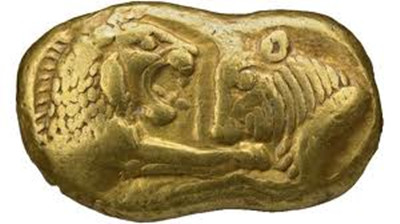But actually it was his own empire, Lydia, that was conquered.
最终,是他自己的帝国吕底亚战败,
Croesus was captured by the great Persian king Cyrus, and he became the world's favourite moralising example of how fortune can turn, even against the richest!
克罗伊斯被居鲁士大帝俘虏。他成为世界上最知名且具具说服力的例子,命运如何充满变数,甚至对最富有的人也是如此!
In fact, his end wasn't so bad.
但其实,他的结局也没那么凄惨,
Cyrus shrewdly appointed Croesus as an advisor-I like to think as his financial advisor-and the victorious Persians quickly adopted the Lydian model, spreading Croesus's coins along the trade routes of the Mediterranean and Asia, and then minting their own coins in pure gold and pure silver at Croesus's mint in Sardis.
居鲁士十分精明,他让克罗伊斯担任自己的顾问—我猜是财政顾问—胜利的波斯迅速釆用了吕底亚模式,克罗伊斯的金币沿着地中海和亚洲的贸易路线散播。其后,波斯人在克罗伊斯位于萨迪斯的造币厂铸造自己的纯金纯银货币。这一做法与库施人征服埃及后吸收埃及文化如出一辙。
It's an intriguing fact that coinage was invented at pretty well the same time in both China and in Turkey, and it's probably not a coincidence.
中国与土耳其几乎在同一时间发明了货币,这也许并非巧合。
Rather, I think, they're both responses to the fundamental changes seen across the world around three thousand years ago from the Mediterranean to the Pacific.
三千年前,从地中海到太平洋,世界正发生着根本性的变革。货币的出现正是在回应这样的变革。
There were military, political and economic upheavals that brought us not only modern coinage, but something else that's resonated till the present day-new ideas about how people and their rulers saw themselves, in short, the beginning of modern political thinking, the world of Confucius and Classical Athens.
军事、政治和经济的巨变带来了现代货币,也带来了一些至今仍能引起共鸣的崭新观念:人民与统治者全新的自我定位。简单来说,这便是现代政治思想的开端,开启了孔夫子与古代雅典的世界。
That's what we're going to be looking at next week, and we're going to start with the people that toppled Croesus-the Persians.
下一部分,我们将以推翻了克罗伊斯统治的波斯人作为起点。













